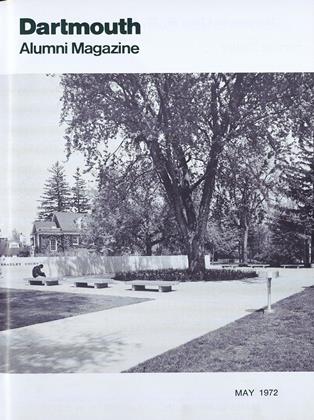By Edward T. Heald. Edited by James B. GT. Heald. Edited by James B. Gidney'36. The Kent State University Press,1972. 367 pp. $10.
It is occasionally more refreshing to encounter history rather than read about it. James B. Gidney has performed a commendable service by bringing to the American reading public a fascinating chronicle of the Russian revolution through the letters of Edward T. Heald, a one-time YMCA secretary stationed in Russia and Siberia from 1916 to 1919. Charged with providing special services for prisoners of war and Allied troops, Heald also managed to write letters which give interesting glimpses of Russia in those historic times: Petrograd in the last days of the Romanovs, Minsk and Kiev during the Kerensky regime, and Siberia during the Allied intervention.
Despite his youth, Heald, a sensitive observer of politics and society, records in great detail those subtle changes which moved Russia away from Tsarism to Communism. Through his eyes we encounter the vascillations of the Kerensky regime, the small ways in which the Kolchak government alienated itself from the Siberians, and the cynical cruelty-and-kindness strategy of the Bolsheviks. Heald also presents several moving descriptions of the Czechs in Siberia, people who earned his greatest respect.
The letters also allow us to meet Heald, the wholesome and optimistic American missionary: he abhors dirtiness, inefficiency, slovenliness, and deceit, and yet loves the people who create a system in which such attributes thrive. He apparently thinks nothing of having his non-Russian-speaking wife travel alone from San Francisco to Vladivostok and then on the trans-Siberian railroad to Petrograd—and all of this during World War I! The entire book is endowed with a feeling of naive sincerity and honesty, and one is more likely than not to accept Heald's various observations, simply because he is so unassuming.
Professor Gidney has indeed put together a book far more interesting than most historical novels. Heald's lively style permits the book to be read in several enjoyable sittings and should provide an extremely satisfying reading experience.
Dartmouth Assistant Professor of RussianLanguage and Literature, Mr. Kalboussteaches Intermediate Conversation and Composition, Introduction to Russian Cultureand Civilization, and Russian Drama of the18th and 19th Centuries.
 View Full Issue
View Full Issue
More From This Issue
-
 Feature
FeatureA Valedictorian Changes His Mind
May 1972 By ALBERT WILLIAM LEVI '32 -
 Feature
FeatureMorton, Kilmarx Elected Charter Trustees
May 1972 -
 Feature
FeatureCharlie Zimmerman: An Appreciation
May 1972 By GEORGE H. COLTON -
 Feature
FeatureThe Nautical Nyes
May 1972 By MARY ROSS -
 Feature
FeatureAmerican Musicologist
May 1972 -
 Feature
FeatureTrade Unionist
May 1972
Books
-
 Books
BooksFACULTY PUBLICATIONS
MARCH, 1928 -
 Books
BooksThis Sceptered Isle
December 1978 By DAVID M. SHRIBMAN '76 -
 Books
BooksPHYSICAL CHEMISTRY FOR STUDENTS OF BIOLOGY AND MEDICINE
June 1933 By John P. Amsden -
 Books
BooksTOMORROW'S BUSINESS.
March 1945 By Malcolm Keir. -
 Books
BooksAMOS JACKMAN.
February 1958 By ROBERT S. MONAHAN '29 -
 Books
BooksSTATE AND LOCAL GOVERNMENT.
NOVEMBER 1962 By VIRGINIA L. CLOSE



